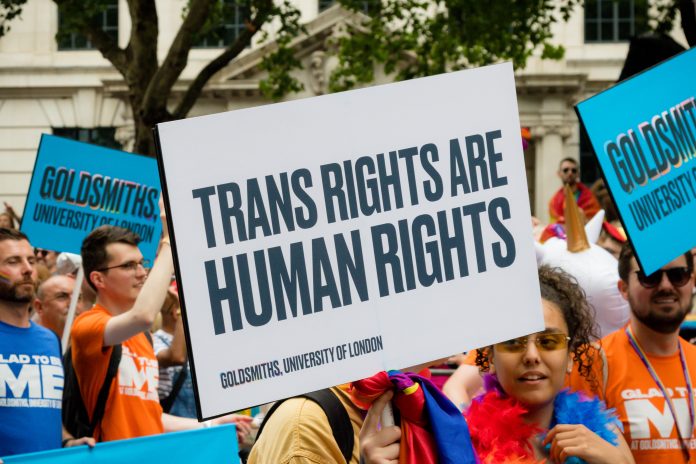Philip Baldwin, LGBTQ activist, talks about how some governments could be using the mandate of Coronavirus measures to undermine LGBTQ rights
Across the world we have seen unprecedented restrictions on civil liberties as a consequence of Coronavirus. Many of these measures are necessary to protect us, sincere attempts by governments to protect their health systems and reduce the spread of and fatalities from Coronavirus.
There are health reasons why governments would want to curtail freedom of assembly, often used in the context of freedom to protest, given the risk of transmitting Coronavirus. However, there has been a wave of legislation curtailing the right to privacy, the right to a fair trial and freedom of the press. And not just from the usual authoritarian regimes.
Uganda, Hungary and the UK all have very different levels of LGBTQ equality. Uganda is one of around 70 countries which criminalise consensual, same-sex sexual activity. Hungary is a member of the European Union, but lags behind other member states in that same-sex couples are not eligible for all of the rights enjoyed by straight couples and there has been consistent anti-LGBTQ rhetoric from Hungarian politicians. The UK remains one of the most LGBTQ friendly places in the world, but is now slipping behind other countries, particularly on trans rights. These three examples demonstrate how the pandemic is impacting global LGBTQ rights in varying ways.
The escalating situation in Uganda and Hungary
In Uganda, there have already been examples of LGBTQ people being directly targetted with legislation designed to combat Coronavirus. On 29 March there was a raid on an LGBTQ shelter in Kyengera, with 19 people who were perceived to be LGBTQ arrested. The pretext for this was an alleged failure to observe social distancing measures. Furthermore, there are reports that those arrested in the raid were not receiving legal assistance, because of Coronavirus measures.
Also at the end of March, Hungary introduced a bill, which subsequently passed, declaring a state of emergency and giving the Hungarian Prime Minister Victor Orbán and his government sweeping new powers to rule by decree, without meaningful oversight from the Hungarian Parliament or other legislative or judicial bodies. This legislation has been enacted without a built-in end date or periodic review.
Two new crimes are created.
Firstly, anyone who promotes information perceived to undermine the Coronavirus effort or which “alarm or agitate” the public can be imprisoned for up to five years. Secondly, anyone who is deemed to have contravened isolation or quarantine orders can be imprisoned for up to five years (a sentence increasing to eight years where the infraction is determined to have resulted in a Coronavirus death).
At the same time the Hungarian government is also advancing legislation ending the legal gender recognition of trans and intersex people. This legislation was introduced when attention globally was focused on the Coronavirus pandemic and in Hungary on the introduction of the new Prime Ministerial powers. It determines that gender should be defined as “biological sex based on primary sex characteristics and chromosomes.” “Sex at birth” would be recorded in the Hungarian civil registry, with no opportunity for records to be amended in the future.
The measures are part of the wider Bill on Changes of Certain Administrative Laws and Free Donation of Property and also mean that an individual’s identification documents cannot subsequently be changed. Where documentation does not reflect gender identity, name or gender expression, Amnesty International give four commonplace examples of where trans people could face discrimination – in finding employment, enrolling in education, obtaining housing or claiming welfare benefits.
Trans rights in the UK?
In the UK, on 22 April, Liz Truss (the Minister for Women and Equalities) gave a speech to the Women and Equalities Select Committee in which she proposed a framework for handling reform of the Gender Recognition Act 2004 (GRA reform). When the consultation for GRA reform was launched in 2018, the aim was to simplify an overly medicalised and bureaucratic system for trans people. Instead the Minister launched a three-pronged attack on trans rights in the UK.
The Minister emphasised “the protection of single-sex spaces,” indicated that a system of “proper checks and balances” was required for trans people, before making remarks about trans children taking “irreversible decisions.” The Minister’s statement was vague, open to a multiplicity of interpretations and she is being put under pressure to clarify her position on LGBTQ equality. However, many were left wondering about its timing, coming at the height of the Coronavirus pandemic in the UK and when Boris Johnson, the Prime Minister, who is arguably more liberal about LGBTQ rights, was in hospital with Coronavirus himself.
It is difficult to prove that LGBTQ people have been targetted with emergency Coronavirus powers. Hungary and Uganda are two clear examples of where LGBTQ people are being victimised, but we must do everything we can to ensure that the rights of LGBTQ people everywhere are protected. We cannot allow Coronavirus to be used as an excuse to roll back LGBTQ rights globally.
Consider joining the Amnesty UK Rainbow Network to learn more about the fight for LGBTQ equality in the UK and globally.





![Europe’s housing crisis: A fundamental social right under pressure Run-down appartment building in southeast Europe set before a moody evening sky. High dynamic range photo. Please see my related collections... [url=search/lightbox/7431206][img]http://i161.photobucket.com/albums/t218/dave9296/Lightbox_Vetta.jpg[/img][/url]](https://www.openaccessgovernment.org/wp-content/uploads/2025/04/iStock-108309610-218x150.jpg)





